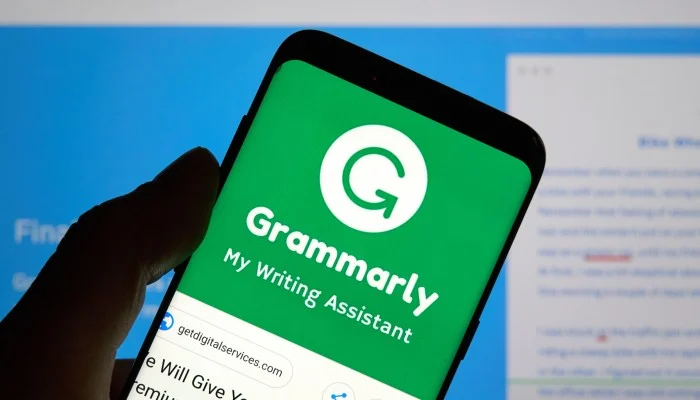“Tyler, with Grammarly’s help, is writing an email to his boss, Anita,” a calm male voice tells us. Tyler, an unassuming, middle-aged man, stares awkwardly at the screen. “Tyler desperately wants Anita to like him, but doesn’t want to sound unsure of himself,” the narrator continues. We are then shown a montage of Tyler failing to connect with his boss through a series of awkward incidents, until Grammarly finally steps in, and Tyler writes the perfect email to Anita. The response includes phrases like “I’m impressed!” and “Such initiative!” The advertisement ends with Tyler chatting it up with Anita in an elevator, both donning wide smiles. “Grammarly. Helping you connect,” the narrator concludes.
This advertisement is misleading, depressing, childish, and sums up a lot of the things wrong with Grammarly—the popular browser extension. You probably already know what Grammarly is and does; but if you don’t, it’s essentially a glorified spelling and grammar-checking software that promises to improve your writing and catch all those annoying little errors in your documents—like confusing affect for effect. At least, that’s what it used to be. More recent ads, like the one above, seem to step into a new territory. The newer commercials promise to increase sales, improve work relations, and, within the last year, they unapologetically offer to write emails for you—something that is harmful to both writing and communication.
In another ad, a woman drafts an email to her coworker, reading, “Your doc is confusing. Fix it,” before asking Grammarly to “make it friendly” and promptly sending off a completely different, AI-generated email. Is Grammarly seriously implying that the average person is so utterly socially inept that they can’t even evaluate the tone of their own email and change it when appropriate?
A grammar and spell-checker has no place in doing the writing for you, especially when writing messages to other people. It also has no business claiming that this service will magically improve your relationships with coworkers. In fact, it will do the exact opposite.
It is usually painfully obvious when something is written by AI, especially one as primitive as Grammarly’s. If you’re trying to improve a relationship with a coworker or boss, a genuine, human-sounding, slightly flawed email will leave a much better impression than one that doesn’t even sound like a person. Even if the email is flawless, it can signal that the sender is a poor communicator and even lazy.
A third ad depicts a group of people sending each other emails and documents with the help of Grammarly to summarize the messages and draft responses. Over time, a reliance on these services will completely erode a person’s ability to write without assistance.
Whether for academic or professional use, there’s nothing wrong with asking for a help with spelling or grammar. But when services like Grammarly start to replace everyday human communication, a line has to be drawn, or else online communication will be nothing but robots writing and responding to robots.
This article also appears in our February 2025 print edition.














